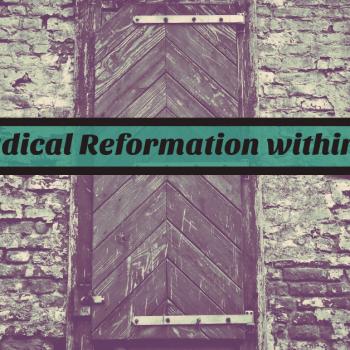The bible is full of helpful character traits that could easily be confused with core values for leadership. Being kind, compassionate, wise, or a servant; are all examples of these. Rather than looking at various characteristics of a leadership in the bible, I want to suggest that a Christian leader is invited to derive her or his values out of the whole of the community of faith. In other words, a Christian leader might ask: What do the Scriptures indicate about the values that guide a local church and how does a leader within the community embody and model such characteristics? What follows is an attempt to identify core values of a biblical church and then to apply them to those who have the gift and calling of leadership.
The first value that is central to a local church and to her leaders is summed up in the word, missional. This is a foundational value, so more time will be spent exploring it as it has ramifications for all of the others. This is a word that has become quite the fad in the larger contemporary evangelical church, and so it is necessary to expound what I mean by the term. To summarize, let me simply say that to be missional simply indicates that: “The church is a movement of grace, justice, and hope.” What follows is an attempt to explain the meaning of the summary statement.
The bible in its essence is a missional book that describes a missional God. From creation to new creation, God is at work within the cosmos to move his project forward towards its ultimate redemption. It has been said that if we removed sin from the bible it would be a pamphlet containing only four chapters: Genesis 1-2 and Revelation 21-22.[1] These four chapters give us the trajectory for what this missionary God has been up to from the beginning, and what he will be up to in the end; he is guiding his creation project from a metaphorical garden to a city. This is a world that can become all it was made for: where God, human image bearers, and all of the created order are in a state of perfect justice or shalom. Unfortunately, we know the reality of the story; it did not go in this ideal direction as humans and fallen angels chose rebellion rather than partnership with God. So now God’s mission is one where grace has intervened in Jesus, where justice can be made known to the victims of the rebellion in the present, and of the hope that the world will not always be like this.
In what follows, I want to build off of that summary and suggest that missional has two subsequent terms that are needed for clarification: message and movement. To truly be a missional church and leader, there must be a message attached to what your mission is trying to accomplish. The message is framed within the larger narrative of Scripture that we explored above. God’s story is centered on this world being embraced by grace. When a person gives their life over to Jesus, the Holy Spirit restores them to right relationship to God, and this person becomes part of the covenant community of faith! If anyone’s allegiance is given to Jesus the Messiah, they become part of God’s new creation. No one is whole without encountering a personal relationship with God through Christ. This overview of the message is needed for a church and leaders who truly value being missional.[2]
A message without a movement is incomplete within the guiding narrative of the Scriptures. The movement element of a missional church and leader is what often separates definitions of this popular word. For many, missional simply means to tell the story of God’s work in the individual in creative ways, but this is not holistic enough. Its scope goes beyond talking about the story and into living the story. This takes place when a community partners with God movement of justice, mercy, humility, grace, and hope. This includes being deeply committed to causes of justice, even when they may require radical changes in how we live.[3] This of course is in light of the framework of the Scriptures, especially regarding how the story ends. God’s mission will be fully accomplished when this world is free from all “death or mourning or crying or pain” which will be consummated by a final act of grace when Christ returns. In God’s renewed world, we will be restored to right relationship to God, people, and creation. Therefore, a missional community will partner with God by living like tomorrow’s world has already begun. This means standing up for the oppressed, elderly, marginalized, poor, disabled, widow, orphan, creation itself, and all the broken places and people of the world; with the desire to join in God’s holistic mission to “gather up all things in heaven and on earth.”[4]












